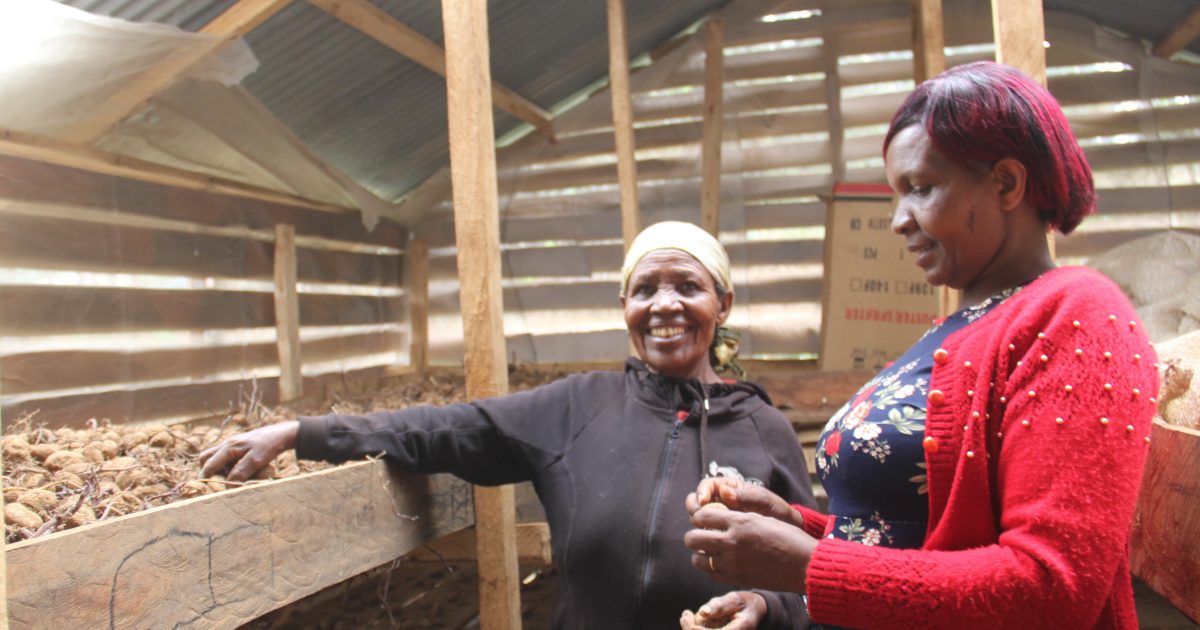The government has unveiled a Sh30 million project in Nakuru to enable more farmers to access certified potato seeds to fight poverty and hunger via increased food production.
Part of the deal involves increasing high quality certified potato seed availability to farmers by 25 per cent through rapid multiplication, increased field seed bulking as well as capacity building of commercial seed growers in the County.
Farmers will be linked to research institutions including Kenya Agriculture and Livestock Research Organisation (KALRO), Agriculture Development Corporation (ADC) and Kenya Plant Health Inspectorate Services (KEPHIS) to ensure they procure clean and certified planting materials.
The project is financed by the Ministry of Agriculture, Livestock and Fisheries under the National Agricultural Rural Inclusive and Growth Project (NARIGP), involves 66 farmer groups in Njoro, Molo, Bahati and Kuresoi North Sub-Counties.
NARIGP capacity building and training coordinator Samuel Yego said 850 farmers have benefited from Kenya Plant Health Inspectorate Services (KEPHIS) expertise to embark on multiplication of seed towards meeting the increasing demand among local growers.
Yego confirmed that construction of 30 Diffused Light Stores was complete (DLS) adding that DLS is a low-cost potato-seed storage technology made from locally available materials.
“The concept of a DLS involves storing seed potato in a natural, diffused light (indirect sunlight) structure with good ventilation and aphid proof netting. Tubers are stored in shelves, trays or crates up to three layers deep. Seed stored in such a manner is high yielding and free from diseases and pests,” Yego explained.
He said potato growers integrated in the project in the four sub counties will be linked to selected manufacturers and dealers of farm inputs to enable them buy fertilisers, pesticides, fungicides and other inputs at subsidized cost.
Potato yields have remained stagnant over the past decade due to use of poor quality seed by small-scale growers, improper post-harvest practices, and climate change and high prices of seeds.
Despite being the country’s second most important food crop after maize, the local potato industry has been facing a severe shortage of clean planting materials, which has led to low production.
The government-owned Agriculture Development Corporation (ADC) and Kenya Agriculture and Livestock Research Organisation were previously the main suppliers of certified potato seeds.
Mr Yego said the project has also enabled 4,500 farmers in the four sub-counties to receive the hybrid variety potato planting material that has a potential to produce up to 180 bags of 50 kilos per acre as compared to the traditional variety that produces an average of 40 bags. The initiative also targets to increase potato consumption due to its high nutritional value.
“Potato is a major crop in Kenya but it doesn’t get the attention that it requires because farmers are still lacking access to certified seeds. Farmers should start planting certified seed that is clean, to stop multiplying of diseases and pests on the fields. When farmers grow clean seeds, it stops the multiplication of pathogen on the farms,” said Mr Yego.
He added that to achieve food nutrition and security the venture is working to remove guesswork from potato farming by encouraging soil testing, the production and application of fertilizer guided by the test results.
“The training component incorporates educating farmers on new farming practices including soil testing and soil and plant nutrition. For the past 20 years Kenyan farmers have been using fertilizers without changing formulations and with no regard for soil type and status. Consequently most of our soils particularly in the maize growing belt cannot support the growth of plants sustainably and give desired yields,” said Yego.
Part of the projections for the project is to help local farmers produce high-end potatoes to enable them access the local markets, especially the franchises which are very keen on quality.
“Most farmers have been using recycled potato seed which possess clones of the same generation and are low yielding and susceptible to diseases. We are working to ensure that seed potato comes with different characters through hybridization” noted the NARIGP Capacity Building and Training Coordinator.
According to KEPHIS only one per cent of potato farmers in the county use official seeds with the rest using recycled seeds from their farms and the informal sector thereby leading to low production of the crop.
The plant inspectorate indicates that shortage of certified potato seeds stagnated production of potatoes at seven tons per hectare against a potential of 40 tons.
Yego observed that the crop was very crucial towards attaining food security as Irish potato (Solanum tuberosum) is the second most important food crop in Kenya, after maize.
The initiative is further encouraging potato farmers to form or join cooperative societies as a way of protecting themselves from exploitation by middlemen and attracting government funding.
“Most potato farmers are not tapping maximum market potential because they are not members of cooperatives. We are keen to help farmers organised in cooperatives,” said Yego.
He added that through the NARIGP the National government was constructing a Sh117 million cold room store in Muchorwe within Molo Sub-County as it seeks to cushion potato farmers against post-harvest losses and eliminate their exploitation by brokers.
The cold room designed to hold four million kilograms of potatoes will be equipped with an information centre and proper storage areas which will prolong the shelf life of the harvest by four to six months and also maintain consistency in quality.
This he said will enable farmers to bulk the commodity and hence improve their bargaining power for better prices.
Yego said the state is also encouraging establishment of potato value-addition factories.
He revealed that potato farmers in the county lose up to 40 percent of their total produce in post-harvest losses. It is estimated that the county produces over 400,000 bags of potatoes.
“Our analysis indicates that potato prices increase three times in two to three months after harvesting. With the facility in place farmers will be able to wait for the right time when prices stabilise before disposing off their produce,” he said.
Currently, farmers sell their produce immediately after harvest, which coincides with a period when other neighbouring counties are harvesting, leading to low prices.
Matendo Kuiga Women group is one of the beneficiaries of the project. According its Secretary Ann Yebei they sell a kilo of potato seed at Sh55 while a 50kg bag goes for Sh2, 750.
Ms Yebei adds “We are still far from meeting the county’s demand for potato seeds; from an acre, we produce close to 55 tonnes of seeds and we have over 20 acres and still that’s not enough to satisfy the market, we hope to increase the acreage to raise this production,” she said.
All seed potatoes produced by the women group are inspected and certified by Kenya Plant Health Inspectorate Service (KEPHIS) and the National Potato Council of Kenya.
“The use of farm-saved seeds, which is the common practice throughout the country, comes with many challenges. Some of them have bacterial seed-borne diseases, others viral or fungal such as potato blight,” notes Ms Yebei.
Ms Ruth Busienei, also a member of Matendo Kuiga Women group said they had started transferring potato seed production and construction of Diffused Light Stores skills to their over 300 members.
“All farmers who planted our clean seeds last season realised more than double harvest compared to what they usually get from on-farm recycled tubers, the reason why the appetite for more clean planting materials is high,” added Ms Busienei.
Nakuru is the second largest producer of the crop in Kenya accounting for 18.9 per cent of national production.
The top producing potato counties are Nyandarua (29.8 per cent) and Elgeyo Marakwet (16.2 per cent). Other potato producing regions include Makueni, Embu, Tharaka Nithi, Samburu, Kajiado and Kwale.
In Nakuru, there are about 20,000 farmers growing potatoes on more than 38,000 acres of land with a total production of 160,000 tonnes of assorted varieties grown with Shangi dominating the sector.
Countrywide, the crop is cultivated by 600,000 to 800,000 farmers with a total production of 1 to 1.4 million tonnes worth Sh30 to Sh40 billion per year. Small-scale farmers contribute 83 per cent of the total production.
The potato sub sector supports 3.8 million people directly and indirectly with the National Potato Council of Kenya putting its worth at over Sh50 billion.
By Jane Ngugi and Dennis Rasto




